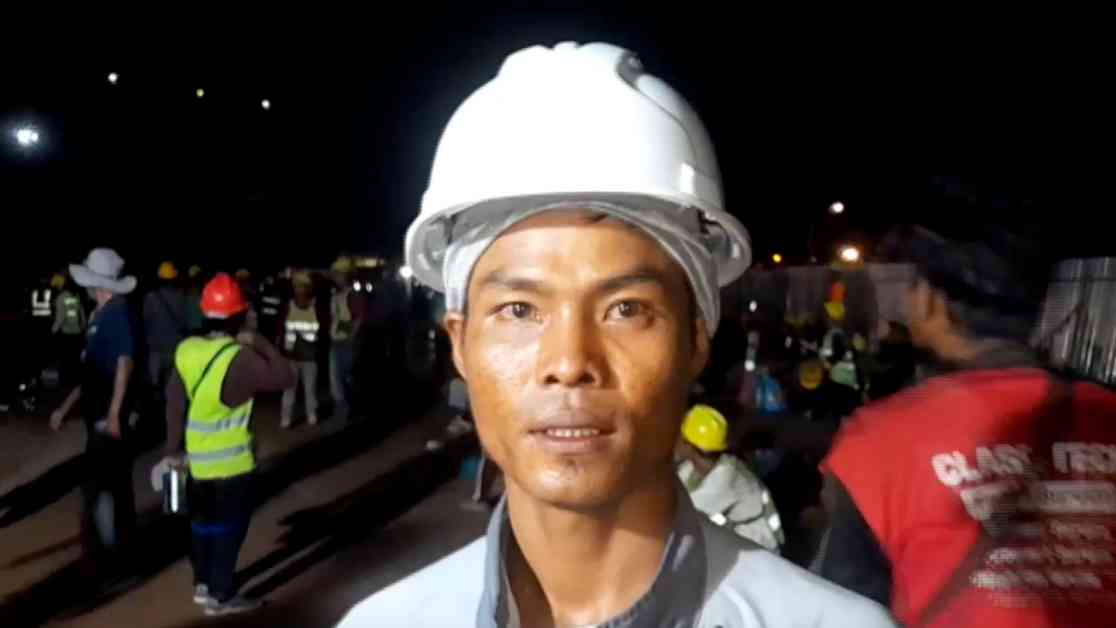Myanmar Labor Protests: Workers Demand Chinese Investors Pay Outstanding Wages
The construction site within the Rojana Industrial Park in Prachinburi, Thailand, has been engulfed in chaos as approximately 700 Myanmar workers have staged a protest, blocking the entrance and exit, demanding that Chinese investors pay their outstanding wages. The workers claim that they have not received their salaries for the past two months, leaving them unable to afford basic necessities like food. Despite the investors offering to pay each worker 500 baht upfront, the laborers refuse to back down. This protest sheds light on the exploitation of foreign workers in the industrial sector and the dire consequences they face when their rights are violated.
Police Response and Worker Grievances
On August 16, 67, authorities from the Rabaipai Police Station in Sri Maha Phot District, Prachinburi Province, were informed of the situation involving around 700 Myanmar workers who had gathered to protest against Chinese investors who had neglected to pay their wages for approximately two months, amounting to a total of 10 million baht. The workers, employed in various construction projects within the Rojana Industrial Park in Prachinburi, have come together to demand fair compensation for their labor. The police, accompanied by a contingent of officers, visited the protest site and encountered a large group of Myanmar workers who had been employed by Chinese investors in the industrial zone. The workers expressed their frustration at being denied their rightful wages while being compelled to work daily, leaving them without enough money to even buy food.
The head of the Myanmar worker group, Suu, aged 33, recounted the hardships faced by his fellow laborers, stating that out of the 700 workers, many had not received their wages for two months. He emphasized that some workers were struggling to afford meals due to the non-payment of their salaries. Despite negotiations with the Chinese investors that offered to pay an initial amount of 500 baht to each worker, the laborers stood firm in their demand to receive all the wages owed to them. Furthermore, they continued to block access to the construction site, refusing to allow the Chinese investors and their supervisors to leave the premises. Only Thai workers were permitted to enter and exit the area, highlighting the workers’ determination to seek justice for their labor rights.
Employer Obligations and Worker Rights
The labor dispute in Rojana Industrial Park underscores the importance of upholding fair labor practices and ensuring that workers are compensated fairly for their contributions. International labor standards dictate that employees should receive timely payment for their work to meet their basic needs and sustain their livelihoods. The failure of Chinese investors to fulfill their financial obligations towards the Myanmar workers not only violates labor laws but also perpetuates a cycle of exploitation and economic vulnerability.
According to the International Labour Organization (ILO), all workers, regardless of their nationality, are entitled to receive fair wages and work in safe conditions. The ongoing protests by the Myanmar workers serve as a reminder of the persistent challenges faced by migrant laborers in foreign countries. These workers often encounter language barriers, cultural differences, and legal uncertainties, making them susceptible to exploitation by unscrupulous employers.
The situation at the Rojana Industrial Park highlights the need for greater oversight and accountability in the recruitment and employment of foreign workers. It is essential for governments, businesses, and civil society organizations to collaborate in ensuring that labor rights are protected and upheld. By addressing the root causes of labor disputes and promoting transparency in employment practices, the rights and well-being of migrant workers can be safeguarded.
Resolution and Future Implications
As the labor protests continue in Rojana Industrial Park, the authorities are urged to intervene promptly and facilitate a dialogue between the workers and the investors to reach a mutually acceptable resolution. It is crucial for both parties to engage in constructive negotiations and find a fair and sustainable solution to the wage dispute. By upholding the principles of fairness and justice, the grievances of the Myanmar workers can be addressed, and their rights as employees respected.
The outcome of this labor dispute will have far-reaching implications for the treatment of migrant workers in Thailand and beyond. It is a test of the government’s commitment to upholding labor rights and ensuring that all workers, regardless of their nationality, are treated with dignity and respect. By holding employers accountable for their actions and promoting ethical labor practices, the rights of migrant workers can be protected, and their contributions to the economy recognized.
In conclusion, the labor protests in Rojana Industrial Park serve as a stark reminder of the challenges faced by migrant workers in foreign countries and the urgent need to address issues of fair treatment and just compensation. By standing in solidarity and demanding their rights, the Myanmar workers have brought attention to the plight of migrant laborers and the systemic injustices they endure. It is essential for all stakeholders to work together to create a more equitable and inclusive labor environment where the rights of workers are respected and upheld. Through collective action and advocacy, positive change can be achieved, ensuring that all workers are treated fairly and with dignity.




















